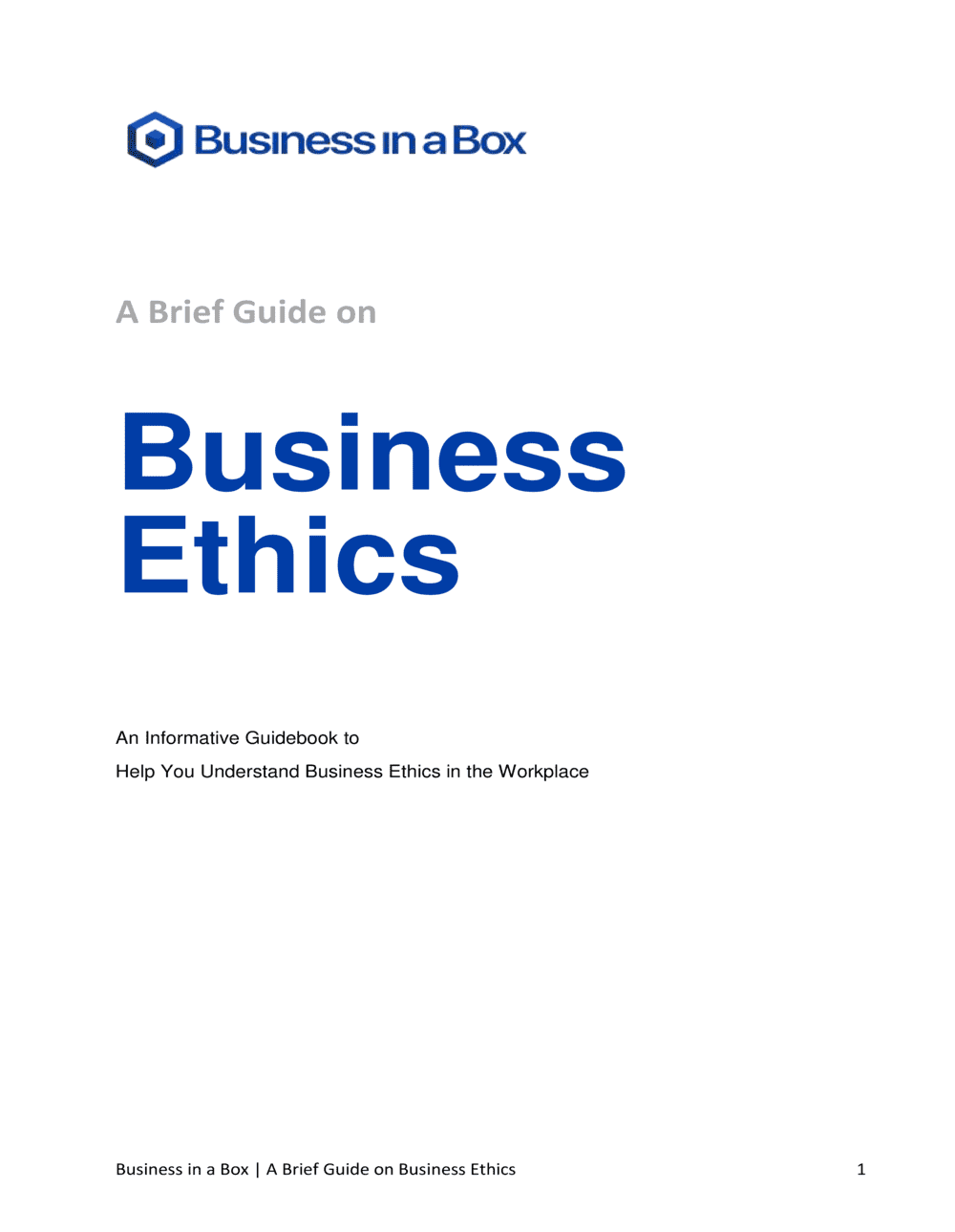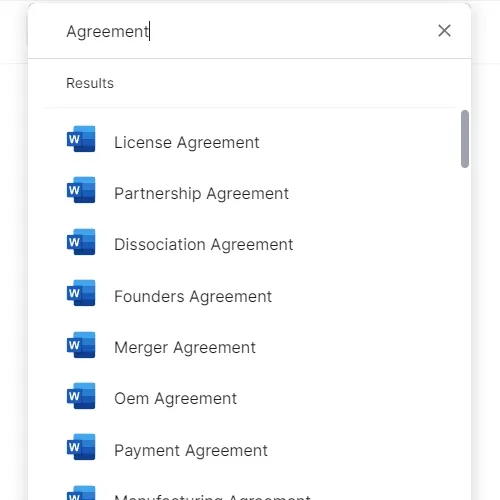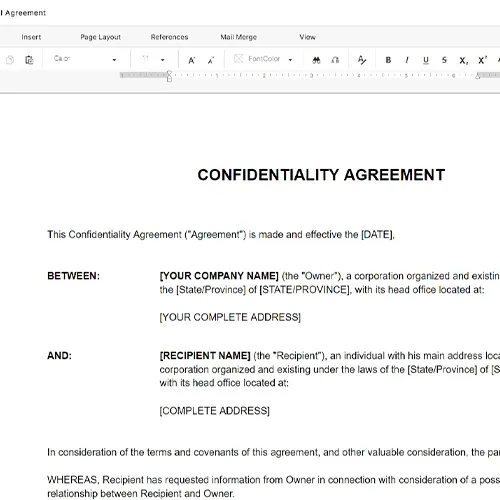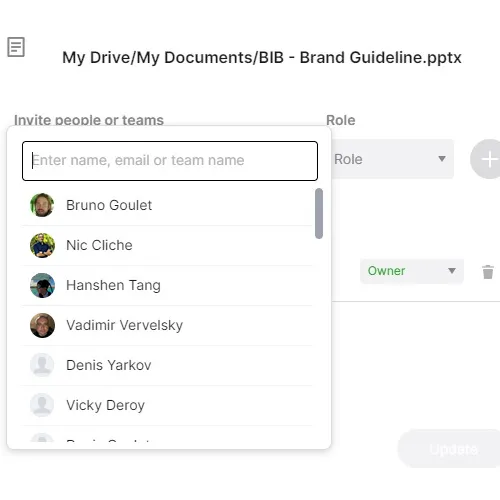Business Ethics Guide

Document content
This business ethics guide template has 11 pages and is a MS Word file type listed under our human resources documents.
Sample of our business ethics guide template:
A Brief Guide on Business Ethics An Informative Guidebook to Help You Understand Business Ethics in the Workplace Table of Contents Business Ethics - An Overview 3 The History of Business Ethics 3 Business Ethics Example 4 Why Do We Need Business Ethics? 4 How to Foster Business Ethics in the Workplace 5 1. Publish Acceptable Behavioral Practices that Your Business Considers…...…….5 2. Ethical Training 5 3. Listen to Other People's Perspectives 6 4. Defend Weak Parties 6 5. Confront Controversial Behaviors in a Constructive Way 6 6. Report Safety Violations, Theft, Harassment or Any Other Illegal Behavior 6 7. Treat Business Partners, Customers, and Society with Honesty and Respect 7 What Ethical Factors Should You Consider in Your Organization? 8 1. Customer Ethics 8 2. Laws 8 3. Ethical Climate 8 4. Whistleblowers 9 Pros & Cons of Business Ethics 10 1. Adherence with the Law 10 2. Better Organizational Culture 10 Cons 11 1. Cost 11 2. Inadequate Management Support 11 Closing Thoughts 11 Business Ethics - An Overview Business ethics is a series of moral principles that lay a foundation for how a business transacts and conducts itself. Moral and legal obligations often intertwine. As a result, the law typically sets the business ethics tone. However, sometimes business ethics offer a fundamental guideline that firms can follow to obtain public approval. Business ethics warrant a specific level of trust between the consumer and other market stakeholders in the business sector. For instance, portfolio managers must give equal opportunities to portfolios of relative and other individual investors. Such ethical practices ensure that people receive fair or equivalent treatment. Interested in business ethics? If yes, this brief guide will help you understand several business ethics issues, including its history, how to integrate it into the workplace, and the pros and cons of business ethics. The History of Business Ethics The business ethics concept emerged in the early 1960s as companies became more conscious of the increasingly consumer-centered society. This society brought forth the rising concerns for corporate responsibility, the environment, and social causes. Social issues emerged as the talk of the town for a whole decade, publicizing the need for companies to act ethically. Since then, the business ethics concept has grown significantly. In the current era, it goes beyond the basic code of right or wrong. It tries to reconcile what organizations should do legally in comparison to maintaining their competitive power. Business Ethics Example Suppose two giant competitors come together to obtain an unfair competitive advantage. In that case, they will control the prices of products in a specific market. Therefore, other smaller businesses in the industry would have no power to compete. This can raise significant ethical concerns because of the unfair competition. Why Do We Need Business Ethics? Business ethics are crucial in the business world and beyond. Compliance with business ethics can have a long-lasting impact on various levels. For instance, the rising investor awareness about governance and social, and environmental issues makes an organization's reputation vulnerable. Suppose a firm engages in unethical practices like poor customer data privacy. In that case, it can lead to a security breach. Such breaches can result in significant losses, including declining share prices, uncompetitive hires, and eroded trust. Therefore, to avoid these risks, companies must adhere to ethical standards to retain their competitive power. How to Foster Business Ethics in the Workplace Many people agree on several fundamental ethical practices. For instance, violence and stealing are generally considered to be unethical and inexcusable. However, when it comes to designing an ethical working environment, this is more demanding than simply abstaining from the widely agreed wrongs. It involves adjusting the thinking patterns at the workplace and embracing the change from within. Simply put, an ethical workplace aligns itself with the law and the spirit to seek the greater good. Ethical organizations do the right things because it is right to do them, benefits aside. Here are some ways that you can facilitate the incorporation of business ethics in your workplace. Publish Acceptable Behavioral Practices that Your Business Considers in its Policy Communication is essential in every aspect of an organization. Publishing universal behavioral guidelines ensures that your employees understand how they're expected to behave. This way, it reduces unintentional unethical behavior at work. By clearly outlining forbidden behaviors, employers address simple ignorance and legitimate confusion on how employees should conduct themselves. Ethical Training Business ethics is easier described than practiced. Therefore, you should foster employees' understanding of your firm's ethical standards by training them. This way, the behavioral guidelines stick in the employees' minds, enhancing a deeper understanding of ethics across the entire organization. Listen to Other People's Perspectives The line between unethical and ethical behaviors may seem clear. However, multiple cultural factors influence how people perceive moral issues. As a result, the line between them becomes blurred. For instance, while many people identify backbiting as unethical, the difference between backbiting and non-toxic gossip differs from one person to another. The ability to listen and respect other people's viewpoints broadens your understanding of people. Therefore, you will be able to solve ethical disputes amicably and equitably. Defend Weak Parties Low-level staff are often the victims of unethical behavior in an organization
3,000+ Templates & Tools to Help You Start, Run & Grow Your Business

Document content
This business ethics guide template has 11 pages and is a MS Word file type listed under our human resources documents.
Sample of our business ethics guide template:
A Brief Guide on Business Ethics An Informative Guidebook to Help You Understand Business Ethics in the Workplace Table of Contents Business Ethics - An Overview 3 The History of Business Ethics 3 Business Ethics Example 4 Why Do We Need Business Ethics? 4 How to Foster Business Ethics in the Workplace 5 1. Publish Acceptable Behavioral Practices that Your Business Considers…...…….5 2. Ethical Training 5 3. Listen to Other People's Perspectives 6 4. Defend Weak Parties 6 5. Confront Controversial Behaviors in a Constructive Way 6 6. Report Safety Violations, Theft, Harassment or Any Other Illegal Behavior 6 7. Treat Business Partners, Customers, and Society with Honesty and Respect 7 What Ethical Factors Should You Consider in Your Organization? 8 1. Customer Ethics 8 2. Laws 8 3. Ethical Climate 8 4. Whistleblowers 9 Pros & Cons of Business Ethics 10 1. Adherence with the Law 10 2. Better Organizational Culture 10 Cons 11 1. Cost 11 2. Inadequate Management Support 11 Closing Thoughts 11 Business Ethics - An Overview Business ethics is a series of moral principles that lay a foundation for how a business transacts and conducts itself. Moral and legal obligations often intertwine. As a result, the law typically sets the business ethics tone. However, sometimes business ethics offer a fundamental guideline that firms can follow to obtain public approval. Business ethics warrant a specific level of trust between the consumer and other market stakeholders in the business sector. For instance, portfolio managers must give equal opportunities to portfolios of relative and other individual investors. Such ethical practices ensure that people receive fair or equivalent treatment. Interested in business ethics? If yes, this brief guide will help you understand several business ethics issues, including its history, how to integrate it into the workplace, and the pros and cons of business ethics. The History of Business Ethics The business ethics concept emerged in the early 1960s as companies became more conscious of the increasingly consumer-centered society. This society brought forth the rising concerns for corporate responsibility, the environment, and social causes. Social issues emerged as the talk of the town for a whole decade, publicizing the need for companies to act ethically. Since then, the business ethics concept has grown significantly. In the current era, it goes beyond the basic code of right or wrong. It tries to reconcile what organizations should do legally in comparison to maintaining their competitive power. Business Ethics Example Suppose two giant competitors come together to obtain an unfair competitive advantage. In that case, they will control the prices of products in a specific market. Therefore, other smaller businesses in the industry would have no power to compete. This can raise significant ethical concerns because of the unfair competition. Why Do We Need Business Ethics? Business ethics are crucial in the business world and beyond. Compliance with business ethics can have a long-lasting impact on various levels. For instance, the rising investor awareness about governance and social, and environmental issues makes an organization's reputation vulnerable. Suppose a firm engages in unethical practices like poor customer data privacy. In that case, it can lead to a security breach. Such breaches can result in significant losses, including declining share prices, uncompetitive hires, and eroded trust. Therefore, to avoid these risks, companies must adhere to ethical standards to retain their competitive power. How to Foster Business Ethics in the Workplace Many people agree on several fundamental ethical practices. For instance, violence and stealing are generally considered to be unethical and inexcusable. However, when it comes to designing an ethical working environment, this is more demanding than simply abstaining from the widely agreed wrongs. It involves adjusting the thinking patterns at the workplace and embracing the change from within. Simply put, an ethical workplace aligns itself with the law and the spirit to seek the greater good. Ethical organizations do the right things because it is right to do them, benefits aside. Here are some ways that you can facilitate the incorporation of business ethics in your workplace. Publish Acceptable Behavioral Practices that Your Business Considers in its Policy Communication is essential in every aspect of an organization. Publishing universal behavioral guidelines ensures that your employees understand how they're expected to behave. This way, it reduces unintentional unethical behavior at work. By clearly outlining forbidden behaviors, employers address simple ignorance and legitimate confusion on how employees should conduct themselves. Ethical Training Business ethics is easier described than practiced. Therefore, you should foster employees' understanding of your firm's ethical standards by training them. This way, the behavioral guidelines stick in the employees' minds, enhancing a deeper understanding of ethics across the entire organization. Listen to Other People's Perspectives The line between unethical and ethical behaviors may seem clear. However, multiple cultural factors influence how people perceive moral issues. As a result, the line between them becomes blurred. For instance, while many people identify backbiting as unethical, the difference between backbiting and non-toxic gossip differs from one person to another. The ability to listen and respect other people's viewpoints broadens your understanding of people. Therefore, you will be able to solve ethical disputes amicably and equitably. Defend Weak Parties Low-level staff are often the victims of unethical behavior in an organization
Easily Create Any Business Document You Need in Minutes.

Access over 3,000+ business and legal templates for any business task, project or initiative.

Customize your ready-made business document template and save it in the cloud.

Share your files and folders with your team. Create a space of seamless collaboration.
Templates and Tools to Manage Every Aspect of Your Business.
Business in a Box Covers Every Business Department
Includes 16 Types of Business Documents You Need
and Achieve Your Business Goals Faster.
